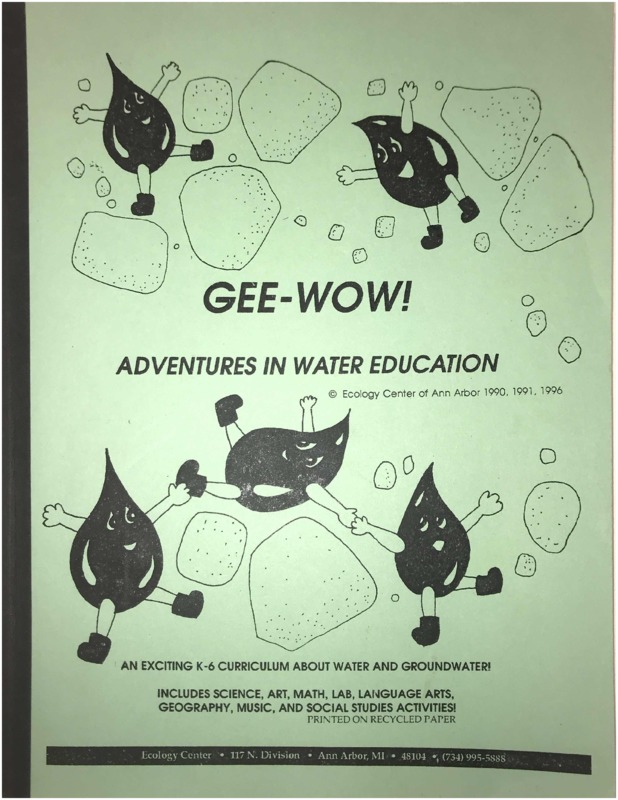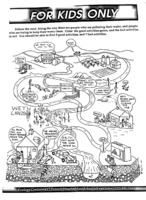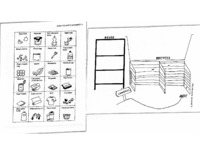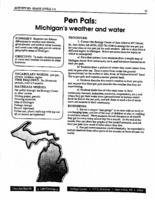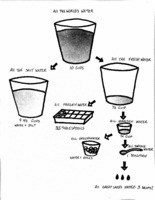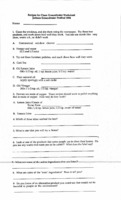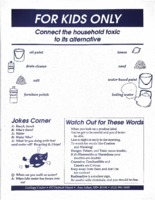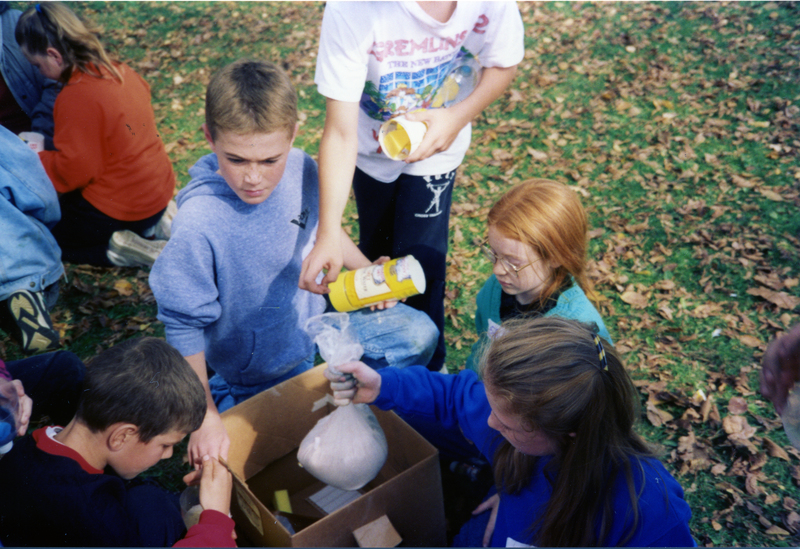GEE-WOW! Takes Off
During the 1980s, the Ecology Center began to focus a lot of effort and attention into groundwater contamination sites, a prevalent issue that a lot of people did not know a lot about. Tara Ward, one of the main staff on the GEE-WOW! project discusses how groundwater is an invisible resource. However, a lot of posters and informational pamphlets on groundwater during this time still portrayed groundwater as a river under the ground. To combat the lack of awareness and regulation around groundwater protection, the EC began Groundwater Education on Wheels, or GEE-WOW!, to introduce students and teachers in southeastern Michigan to the complex scientific and technological issues surrounding groundwater protection.
Some of GEE-WOW’s great successes in the 1990s include their educational video, “Its Found Underground: Groundwater, Our Buried Treasure” geared to upper elementary and middle school students which received an award at the North American Association of Environmental Educators in November 1991, Hydrotopia (a computer software program), and the Groundwater Festival of 1993.
The program began with a 3-year grant from the W.K. Kellogg Foundation of Battle Creek, through which they were able to create and present interactive lessons to primary school classes in Washtenaw and Lenawee Counties. During the 1990s, the Groundwater Education on Wheels program really began to take off. The GEE-WOW program allowed the EC to get out of the office and into the classroom. With the grant, the EC created a curricula based on the pressing questions that students wanted to know, taught teachers throughout southeastern Michigan, provided assembly programs, and a couple of community events, field trips, and interactive games where students could take their knowledge outside of the classroom.
Environmental education specialist Tara Ward was one of the lead authors of the GEE-WOW! curriculum. In a June 19, 2019 interview, she reflects on the Ecology Center's philosophy behind educating the next generation.
"For me, the idea was that education needs to lead to action, so all of our lessons we did had a 'what you can do' if not focus, at least a 'what you can do' portion to the lesson. So we wouldn't just go out and tell the kids, you know, 'Groundwater is really important and it's all polluted and there's nothing we can do about it.' We talked about personal action."
On a Tuesday in mid-May, 1993, the Ann Arbor News followed the Ecology Center's Ruth Kraut and Claire Pferdner to Slauson Middle School to see one of GEE-WOW's demonstrations in action. Holding up a home-made groundwater model, Kraut asked students to "imagine this as the distance between Slauson and downtown Ann Arbor,” to “think of it as a place you really care about."
With these groundwater models, GEE-WOW! helped the students to think in complex ways about the issues that affect their community--even if those issues weren’t always visible to the naked eye. By the end of Kraut's lesson, the Ann Arbor News walked over to an 11 year old named Paul who was discussing with his small group about how they could reduce pollution in their model landfill. Paul’s solution: "We need recycling".
HYDROTOPIA!
In June 1992, GEE-WOW announced developments on a brand new software designed for classroom use, grades 4-8. The inventive and exciting computer program known as HYDROTOPIA!, was designed to teach students ways to properly dispose of hazardous waste, alternatives to hazardous projects, and how groundwater becomes contaminated. The program was set up so that children make decisions between various hazardous and non-hazardous alternatives. The game begins with the student entering their community of Hydrotopia, and along the way, they must accomplish household “tasks” such as cleaning a countertop, or removing a stain from a carpet. While playing, the game encourages older students to read the ingredients to make an informed decision, and younger students to simply choose a product. They then decide how to dispose of either the entire product or just the container. For each choice the student makes, they receive a corresponding score, telling them how “environmentally sound” their decision was.
The software was designed to teach students about hazardous waste alternatives, proper disposal methods, and groundwater in a fun, inventive, and engaging way. The score goes beyond just the decision, but also includes the community impact because it changes based on how many members of the community make the same choice. The more environmentally sound the decision, the better the community. Those who do not dispose of their waste properly, or do not choose hazardous waste alternatives, would see the impact on their community.
The innovativeness of this game allowed students to see the repercussions of their decisions and instill a sense of responsibility in young children which could have a lasting impact on the next generation’s future decisions.
Jackson Groundwater Festival 1993
In October 1993, the Ecology Center and Jackson International School District cooperated to create the first ever groundwater festival. The festival was designed for 5th grade students and planned to serve about 600 students.
The festival included six learning stations with a curriculum developed by the Groundwater Education in Michigan, including one with hands-on groundwater models, puddle Pictionary, talking with a local driller, and “Hazardous and Solid Waste – The Groundwater Connection” where students could build mini-landfills. Along with the learning stations were training sessions for high school classes, parent/teacher workshops, and various performers.
In Jackson, there was an ever-growing concern over their groundwater resources which were being depleted. The county decided that this would be a great way to educate the future generation along with teachers and parents about the importance of groundwater education, while providing hands-on and problem solving activities to students. The curriculum provided by the Jackson Company Math/Science Center was a pilot program, and this gave them the opportunity to begin their second phase. The Ecology Center was responsible for the legal contracts and staff members Tara Ward, Ruth Kraut, and Claire Pferdner were instrumental in providing ideas and advice based on the GEE-WOW curriculum. This festival was also forward-thinking because they reached out to local high school students to act as educators to the younger students, encouraging participation of all ages.
The Legacy of GEE-WOW
GEE-WOW came of age during an important transition in the field of education. More and more educators began to think of schools not as places where information is transmitted from teacher to student, but as communities where students and teachers co-construct knowledge and deliberate about pressing issues. GEE-WOW and the Environmental Education movement embraced this constructivist idea of education and, perhaps more importantly, coupled it with the urgent need to position students as environmental change-makers (see, for example, the “Tell the Town Activity” in the K-6 activity guide).
Since GEE-WOW ended in the mid 2000s, the Ecology Center education program has expanded to include a wide variety of topics, including sustainable food systems, renewable energy, green chemistry, and much more. Current zero-waste workshops incorporate the groundwater pollution content developed as part of GEE-WOW, and continue the EC tradition of meeting people where they are with education on timely environmental health issues. In 2021, the EC is developing new resources to prevent lead poisoning and clean-up air pollution through community and classroom education. Across these programs, the focus on student-centered inquiry and action remains.

